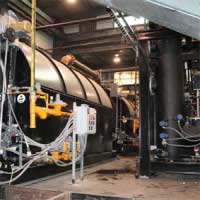
"No. 2 oil can be used as fuel for industrial boilers or, with the addition of additives, it can be used as diesel
transport fuel. Similar to No. 6 oil, No. 2 oil is also consumer-ready directly from the P2O process. The P2O
process includes an in-line injection of additives to make diesel fuel when desired. JBI Inc. currently sells its
No. 2 oil to Coco Paving Inc. and US Steel ." (page 50)
"Based on the SAIC business model, a 31,700-ton per year commercial P2O facility operating at
approximately 75% availability is estimated to generate a net income of $357 per ton of plastic waste.
Meanwhile, the EEC analysis estimates a net income of $276 per ton of plastic waste . EEC estimates that the
costs of the P2O facility, specifically the capital cost, fixed operating costs, and general administrative costs,
should be higher than those provided in the SAIC model. Furthermore, the EEC analysis takes into account
the additional cost of collection, sorting, and delivery of plastic waste to the pyrolysis plant." (page 55)
"JBI Inc’s P2O process is advantageous compared to the pyrolysis technologies of Agilyx and CGI
because it has the highest operating capacity at a low footprint, it has the highest oil production yield, and it
has the least environmental impacts. Furthermore, JBI Inc. is the only company that has managed to
successfully recycle all of its light combustible gaseous products of pyrolysis for energy use in its process.
This significantly reduces the overall external energy demand of the process as well as overall CO2 emissions.
The P2O process is an economically competitive alternative to landfill disposal because it has a low total
estimated cost and it generates a significant net income per ton of plastic waste processed." (page 73)
http://www.seas.columbia.edu/earth/wtert/sofo...h%2016.pdf
